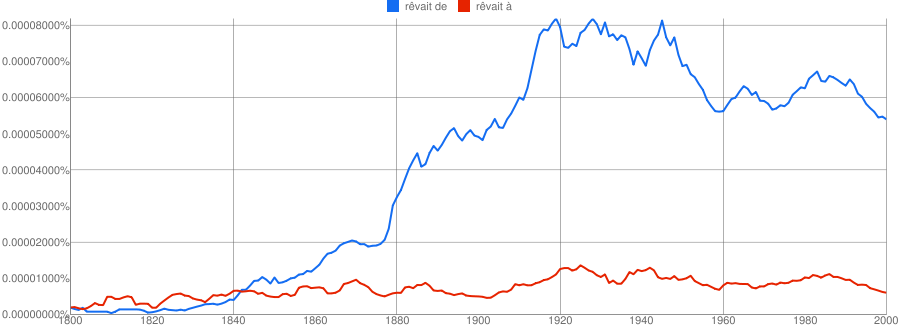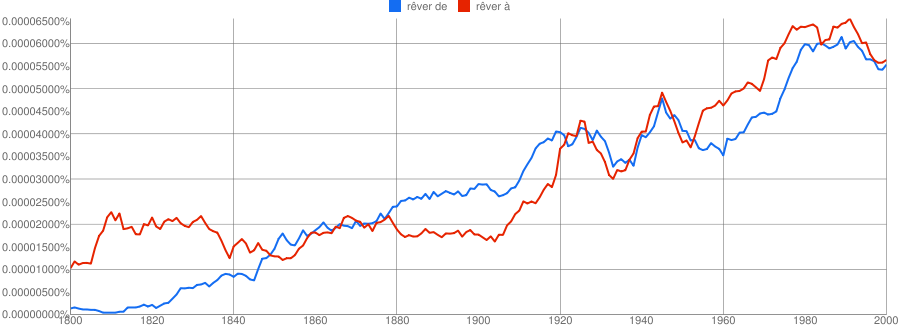Ces extraits ci-dessous expliquent la nécessité de la préposition de après rêver. J'omets l'usage de > pour conserver la lisibilité.
Source: pp 373-374, The semantics of ‘empty prepositions’ in French (1996) by Kemmer and Shyldkrot, as part of Cognitive Linguistics in the Redwoods: The Expansion of a New Paradigm in Linguistics edited by Eugene H. Casad.
Assuming that in at least some of these cases the distinction between the å and de expressions is somewhat archaic (insofar as speakers now reject one of the forms), we believe that we are dealing with
cases in which the earlier mode of expressing the distinction between
two modes of 'trying' was with a difference in preposition with the
same lexical root, while the modern language tends to use lexical distinctions, i.e. choice of a verb requiring å vs. one requiring de. Notice
that in both cases, choice is involved, although in one case it is at the
level of choice of preposition while in the other it is at the level of
predicate choice. The difference between these two modes of expression of the semantic distinction in question seems somewhat trivial in
this light. rather more insignificant than would be suggested by an
analysis in which the preposition is meaningful where there is a choice
of prepositions with the same predicate, but meaningless when different verbs are used.
Let us look at a further example in which the obligatory use of a
preposition in the infinitive construction is associated with a contrast
in meaning. The examples in (12), cited in Gougenheim (1959: 12),
contrast two verbs of similar semantics, rêver and songer, both of
which refer to a subject's thought processes.
(12)
a. Je rêve d'acheter une automobile. 'I dream of buying a car.'
b. Je songe à acheter une automobile. 'I'm thinking of buying a car.'
Here again we find a difference in lexical semantics between the two
verbs, although in this case we are dealing with formally distinct verb
roots (unlike the cases of décider de/se décider à, etc. considered
above). Songer indicates that the speaker is actively considering a future purchase, while river, used here in the sense of wishing for something unattainable, does not. The difference in preposition is coherent
with the fact that songer has as part of its semantics the property of intentionality or purpose directed at the ground that is lacking in the
verb réver. Moreover, once again there is a contrast in terms of expectations: the lexical semantics of songer include the default
on the part of the speaker that he/she will carry out the infinitival process; hence the use of à.
In keeping with our discussion above, we can say in this case that
while the individual predicates may require a particular preposition,
the speaker nevertheless has a choice of using a predicate invoking a
path-goal construal, or one of somewhat similar meaning but lacking
in such a construal. The preposition that appears in each case is one
that is compatible with the semantics of the verb, and redundantly en-
codes the relation between the main verbal process and the infinitival
Source: p 183, French prepositions à and de
in infinitival complements,
A pragma-semantic analysis (2008) by Lidia Fraczak, as part of Adpositions ; Pragmatic, semantic and syntactic perspectives (2008) edited by D Kurzon, S Adler
Kemmer and Bat-Zeev Shyldkrot analyze the difference between the expressions
songer à faire (“to think of doing”) and rêver de faire (“to dream of doing”,
“to long to do”), as in the examples below, by ascribing the meaning of “actively
considering a future purchase” to the former, and the meaning of “wishing for
something unattainable” to the latter (1995: 374).
(20) Je rêve d’acheter une automobile.
‘I dream of buying a car.’
(21) Je songe à acheter une automobile.
‘I’m considering buying a car.’
In terms of our thesis, with songer à, unlike with rêver de, two possibilities are
considered: in this case, “to buy” and “not to buy”, which constitutes “ambivalent
vision” of the fact in question.


